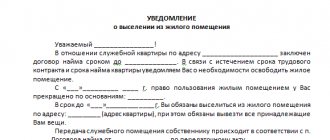Home / Housing disputes / Notice, demand, warning about eviction from an apartment and residential premises
Termination of the right to use residential premises means the eviction of a person from the apartment he occupies. Most often, the resettlement procedure is initiated through the court. After completion of the trial, the tenant is notified to vacate the premises. There is also a warning to the tenant and a requirement to vacate the living space. What to do if the tenant ignores all letters? Feel free to file a claim for eviction from the apartment.
It's time to talk about the rules for drawing up and submitting a notice. Let's begin our consideration with the grounds for evicting a tenant.
Reasons for eviction
According to the law, a person has the right to housing - as evidenced by Art. 40 of the Constitution of the Russian Federation. But often residents lose the right to live in residential premises. There is a need to evict them. Of course, we need grounds that give the right to tell the tenant to pack his things and move out of the apartment.
What reasons lead to eviction from a residential premises:
- Failure to make rent payments under a rental agreement.
- Use of the apartment for other than its intended purpose (creation of a warehouse, shelter, catering outlet, etc.).
- Emergency condition of a residential property.
- Carrying out major repairs to the house in which the living space is located.
- Transfer of ownership to a new owner (sale, donation, inheritance of an apartment).
- Changing the purpose of residential premises (conversion into an office or retail pavilion).
- Other reasons.
to simply kick a person out of an apartment . The owner of the premises or the administration must have evidence of the validity of their decision. For example, a court order, a signed act of transfer of an object, an approved Regulation, an order from the Administration, etc.
Even if the eviction is justified, tenants must receive notice. Homeowners are often forced to warn negligent tenants. Evacuation without notice is an arbitrariness that can be appealed in court.
When is a claim filed?
Often the rights of the owner are violated by persons who become defendants in eviction cases:
- former spouses who are not the owners of the premises;
- former owners of the property and family members;
- illegally using housing;
- employers whose established tenure has ended and members of their families.
The reasons for eviction are the following facts:
- loss of the right to use housing or the absence of such initially (Article 35 of the Housing Code of the Russian Federation);
- systematic violation of rights of use;
- illegal redevelopment, improper use (in relation to the owner).
Notice, demand, warning - difference
Even from the names it is clear that the concepts differ from each other. Therefore, before drawing up an official document, you need to understand what it is and what purpose it serves.
Legal side of the differences:
- Warning
The owner's initial pre-trial claim is expressed in a warning to the tenant about unacceptable behavior. For example, if these are violations of a technical nature, the owner of the apartment demands their elimination at the expense of the tenant himself. A certain period of time is given for correction. Ignoring the warning leads to the next stage - filing a claim in court.
- Requirement
There are two types of requirements: notification and compulsory. The first case is standard: the owner of the property informs the tenants so that they leave the premises. The reasons may be the sale of the apartment or the expiration of the lease agreement (Article 684 of the Civil Code of the Russian Federation). Naturally, residents are given a period of time to pack their belongings and find new housing.
The requirement of a coercive nature is more persistent. The owner of the residential premises sets strict conditions: eliminate the violation or leave the occupied living space. This is usually enough to make the offender think about his behavior. But it also happens that you cannot do without a trial.
- Notification
Delivered to the tenant after a court decision has been made. The notice contains the reasons for the relocation and a link to the court order. The deadline for eviction is final and cannot be changed. If the tenant does not move out within the specified time, the landlord has the right to contact the bailiffs or the police.
It's winter, but you need to get rid of your tenants? Read about the nuances in the article “Is it possible to evict tenants in winter?”
What documentation is prepared at the beginning of the procedure?
It begins with a statement of claim .
The document is submitted, in accordance with the Civil Procedure Code of the Russian Federation, at the location of the defendant.
The claim must
indicate :
- full name of the court;
- passport information of the evicted applicant;
- requirement to evict (specify legal norms);
- why do you think that the specified person no longer has the right to stay within the walls of the house;
- what pre-trial measures were taken and what results they produced;
- what papers do you use to support your claim?
In addition to the claim itself, the following papers are required :
- identification;
- certificate of registration of the defendant in form -9 (the “age” of the certificate is a maximum of a month);
- state duty receipt;
- registration certificate for housing;
- social tenancy agreement (or order; also - purchase and sale agreement);
- documented evidence of the impossibility of the defendant’s continued residence in the dwelling (for example: the apartment was sold to another person, a transaction agreement will be required);
- copies of the statement of claim in accordance with the number of participants in the process.
It should be remembered that to draw up such a claim, it is better to contact a competent lawyer , because the average person may not take into account insignificant details in his opinion, and they can ruin the whole case. Or the judge will consider the statement insufficiently reasoned, and this will be considered a “point” in favor of the opponent and will give him the opportunity to justify himself.
It also happens that citizens are evicted administratively, without the involvement of judges, but with the appropriate order of the prosecutor.
Read about the eviction of illegal residents here.
This happens in cases :
- unauthorized occupancy;
- if citizens live in hazardous housing.
How to correctly write a notice to evict a residential premises
The notification is not given orally - the notification must be strictly in writing. Only in this case can the document be regarded as official.
The notice is drawn up on an A4 sheet, and if the owner is an organization, on the official letterhead of a legal entity with a seal.
How to fill out the notification correctly:
- The upper right corner is the citizen’s full name and residential address.
- In the center of the sheet is the title of the document (“... about eviction from a residential premises”).
- Text of the document - first indicates the address from where the person is being evicted; further, the reason for such a decision follows (for example, in connection with a court decision on eviction - the number of the decision, who issued it and when, the date it entered into legal force).
- Notice of deadlines – the period allotted to a citizen for relocation from an apartment or private house. In addition, information is brought to the attention of the application of forced eviction measures in case of disobedience to the court decision.
- Information about the owner – individual or legal entity.
- Signature and decryption of the signature.
- Act of receipt of notice - space for number, date and signature.
Expert opinion
Semyon Frolov
Lawyer. 7 years of experience. Specialization: family, inheritance, housing law.
Lawyers advise including the exact coordinates of the residential premises in the notice. In addition to the address, you must indicate the building/building number, entrance, floor, technical data of the apartment and other information. Practice shows that in this case no questions arise - the tenant will be obliged to move out of the living space without any misunderstandings. If such information is not available or if it is interpreted in two ways, there is a risk of delaying eviction from the apartment. Stick to precise wording!
Processing times and state fees
Claims for eviction are considered in accordance with the general procedure within 2 months from the date of filing the claim.
The state duty is paid as for claims of a non-property nature . Its size is 300 rubles.
Since the deprivation of private property is prohibited by the Constitution, it is very difficult to evict the owner from the apartment. It is better to apply other measures of influence to such a violator: bringing to administrative and criminal liability. Evicting a tenant is not very difficult and, if fair warnings are ignored, going to court will be an effective influence on him.
Sample notice, requirement, warning about eviction from an apartment
In order to draw up a notice (demand, warning), you need to fill out a standard form. Please note that situations may vary. It is not a fact that your case falls under a special case. It is likely that a special form of notification (demands, warnings) will be needed. This is best explained by a lawyer, whose advice you can get directly on our website.
The notification is drawn up according to the sample. It's another matter if you need to write a requirement or warning. These documents do not have special forms. But their compilation is also subject to certain rules.
How to correctly draw up a demand for eviction from an apartment:
- top line – to whom the request is addressed;
- a message that you are the legal owner of the apartment at ____ address;
- requirement to vacate the living space along with things;
- deadline for eviction from an apartment or residential premises;
- an indication of the reason for the tenant's evacuation;
- intention to go to court in case of non-fulfillment of the requirement;
- date and signature.
A notice to evict an apartment may not contain any requirements to leave the living space immediately. This is rather a notice of the need to eliminate violations. The warning is drawn up by analogy with the requirement. The only difference is in the reasons and conditions. The owner must indicate what he considers a violation and oblige the tenant to eliminate the consequences within the allotted time.
Papers after the trial
This:
- the court's decision;
- performance list;
- inventory of property and eviction act;
- document on deregistration.
A judicial eviction usually takes three months . The first two are usually occupied by the preliminary hearing and consideration of the case . Then another month remains as a period for appeal . And only after this the decision comes into force.
The court decision specifically states that it is the legal basis for the defendant's discharge. The plaintiff with this document comes to the territorial department of the Federal Migration Service or the passport office and the defendant will be deregistered unilaterally . Eviction may occur without provision of alternative accommodation.
To implement the court decision, the final document on the case is sent to the FSSP. From there, subpoenas to the participants in the case. It may very well be that the person being evicted does not want any trouble and will vacate the premises himself. If this does not happen, the bailiffs will be expelled from their native walls without ceremony . After this, the evicted person’s belongings are sent to the storage location and a decision is made to terminate the proceedings.
Read about the process of eviction from municipal housing, from hostels and tenants who do not pay rent in the materials on our website.
How to send a notification?
It is not difficult to draw up a notice (warning, demand) about eviction. It is much more important to give them to the evicte/violator. There are detailed instructions for this.
Ways to convey a notification (warning, demand) to a citizen:
- Postal telegram
It is transmitted online to the person being evicted from the apartment. For example, if the latter lives in another city. The owner must come to the post office, draw up a notice and certify a copy of the telegram (with a return response about receipt). A copy can be received 2-3 days after sending the telegram. Thus, the owner of the apartment personally notifies the tenant, as evidenced by written evidence - a copy of the notice.
- Ordered letter
Sent by mail along with a receipt receipt and a list of attachments (done by a postal employee). The completed inventory has two copies - one remains with the sender, and the other is delivered to the recipient. In total, the owner remains with: a copy of the notice (demands, warnings), a copy of the list of investments, a payment receipt and a tracking number. All this serves as evidence of the tenant’s notice of eviction from the apartment.
- Delivery in person
Before giving the notice to the person being evicted, you need to prepare an identical copy. On it, the recipient writes his full name and signs receipt. Be prepared for the fact that the tenant simply refuses to receive the notice. For such cases, there are separate instructions: come to the delivery of the notice with a couple of witnesses. Neighbors or relatives are perfect, always with passports. Having heard about the tenant’s refusal, witnesses record on the second copy of the notice the fact of the evicted person’s refusal. Next, they will need to confirm their records at a court hearing (if the eviction order has not yet been rendered).
Many people ask the question, what is the best way to serve a notice to evict a tenant? The best option is by registered mail . You will know for sure whether the person being evicted received the notice or refused to receive it. The most important thing is to have copies of all documents sent.
Required documents
Article 132 of the Code of Civil Procedure of the Russian Federation provides a list of documents that must be attached to the claim :
- a copy of the claim for the defendant;
- receipt of payment of state duty;
- power of attorney, if there is a representative;
- documents confirming the facts stated in the statement of claim;
- documents confirming the fact of warning the defendant about illegal behavior and violation of the rules of residence.
For eviction claims, supporting documents or evidence will be:
- appeals to municipal authorities;
- appeals to law enforcement agencies (precinct commissioner, prosecutor's office, Ministry of Emergency Situations);
- appeals to the sanitary and epidemiological station;
- protocols, inspection reports and other recording of violations;
- written responses from the above authorities.
Warnings from the defendant about the inadmissibility of unlawful behavior and the elimination of violations must be recorded in writing.
To do this, a written warning should be delivered against signature or sent by mail to the defendant’s address by registered mail with an inventory. You can learn about the differences between a warning, a demand, and an eviction notice here.
Legal assistance
Drawing up and sending a notice is a rather troublesome procedure. Without legal knowledge, it is easy to make mistakes and completely delay the eviction of a tenant. It is important to understand that a universal notification form simply does not exist. Before filling out a notice to vacate the premises, you need to understand the nuances of the situation.
Do not rely only on your knowledge, because today you can take advantage of free legal advice.
The lawyers of our portal will study your problem and try to help within the framework of the law. The chances of correctly drafting a notice together with a lawyer are many times higher than doing it on your own. Attention!
- Due to frequent changes in legislation, information sometimes becomes outdated faster than we can update it on the website.
- All cases are very individual and depend on many factors. Basic information does not guarantee a solution to your specific problems.
That's why FREE expert consultants work for you around the clock!
- via the form (below), or via online chat
- Call the hotline:
- Moscow and the Region
- St. Petersburg and region
- FREE for a lawyer!
By submitting data you agree to the Consent to PD Processing, PD Processing Policy and User Agreement.
Anonymously
Information about you will not be disclosed
Fast
Fill out the form and a lawyer will contact you within 5 minutes
Tell your friends
Rate ( 1 ratings, average: 5.00 out of 5)
Author of the article
Maxim Privalov
Lawyer. 2 years of experience. I specialize in civil disputes in the field of housing and family law.
Author's rating
Articles written
610






